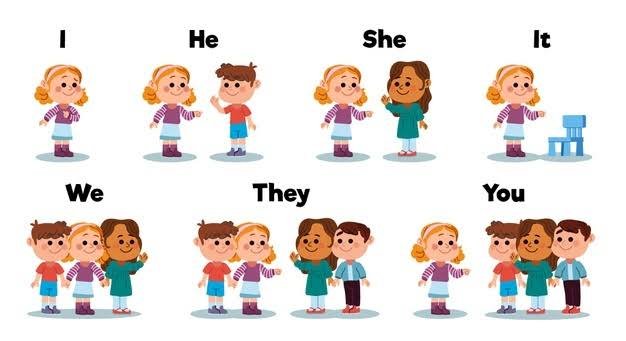Pronoun.
A pronoun stands in place of a noun(to avoid) repeating.
Examples:
he
me
it
him
Ahmad is my friend, he is my class fellow.
personal pronouns.01
Subject pronoun.02
- I go to school.You write a letter etc..
Object Pronoun.03
Examples.
- I teach them urdu.(them)
- Azeem gives me a orange.(me)
- He was telling lie to him.(him)
- We shall fight for them.(them)
Possessive Pronouns.04
We use possessive pronouns depending on.
Number:singular (mine) or plural (ours) .
person.
- 1St person (mine)
- 2nd person(yours)
- 3rd person(his)
Gender.
- Male (his)
- Female(hers)
Case of Pronouns
| persons | Subjective Case | Possessive Case | Objective case | Reflexive Case |
|---|---|---|---|---|
| 1St person singular | I | My/Mine | Me | Myself |
| 1St person plural | We | Our/ours | Us | Ourselves |
| 2nd person singular/plural | You | Your/Yours | You | Yourself/Yourselves |
| 3rd person singular | He | His | Him | Himself |
| She | Her/Hers | Her | Herself | |
| It | it's | it | itself | |
| 3rd person Plural | They | Their /Theirs | Them | Themselves |
Reflexive Pronouns.05
Source
- He hurt himself while playing hockey.(himself while).
- They took the responsibility on themselves.(themselves).
Emphatic Pronouns.06
- He himself told me this.(himself)
- I finished the job myself. (myself)
Notes.
The emphatic pronouns can't be used as subjects.it is therefore wrong to say.
John and myself went there.
Herself swam in the river.
I invited herself to tea.
The correct sentences are as follows:
John and I went there.
She swam in the river.
I invited her to tea.
Relative Pronoun.07
Examples.
- I know we boy. The boy came from Karachi.
I know the boy who came from Karachi.(who) - This is the book.This book belongs to my uncle.
This is the book which belongs to my uncle.(which)
Indefinite Pronoun. 08
The most common ones are.
Indefinite pronouns singular or prural?
| Singular indefinite pronouns | Plural indefinite pronouns | indefinite pronouns which can be singular or plural |
|---|---|---|
| Another | Both | All |
| Anybody | Few | Any |
| Anyone | fewer | More |
| Anything | Many | Most |
| Each | Others | None |
| Either | Several | Some |
| Enough | Such | |
| Everybody | ||
| Everyone | ||
| Everything | ||
| Less | ||
| Little | ||
| Much | ||
| Neither | ||
| Nobody | ||
| No-one | ||
| One | ||
| Other | ||
| Somebody | ||
| Someone | ||
| Something |
Activity
Under line the indefinite pronouns in the following sentences.
- I saw somebody there.(Somebody)
- Did you see anybody there?(Anybody)
- would you like something better.(Something)
- Everybody is present in the hall.(Everybody)
- Nobody came to the meeting.(Nobody)
- Is there anything in the drawer?(Anything)
- Some are born great.(Some)
- He is a man of few words.(Few)
- One never knows who might be listening.(One)
- Many of them were Christians.(Many)
- is there anything in that inbox.(Anything)
Demonstrative Pronoun.09
A demonstrative pronoun represents a thing or things.
- near in distance or time (that, these)
- far in distance or time (that,those)
Example.
- I really like this.
- I heard that.
- These look perfect.
- I own those.
Conclusion.
Best Regards By
Posted using PLAY STEEM https://playsteem.app

Downvoting a post can decrease pending rewards and make it less visible. Common reasons:
Submit
Downvoting a post can decrease pending rewards and make it less visible. Common reasons:
Submit
This is my own content where I need a full explanation so I can remove them please
Downvoting a post can decrease pending rewards and make it less visible. Common reasons:
Submit
1 https://examples.yourdictionary.com/examples-of-possessive-pronouns.html
2 https://www.englishpractice.com/improve/reflexive-emphatic-pronouns/
3 https://www.grammar-monster.com/glossary/indefinite_pronoun.htm
There are the sources.
It is ok to take inspiration from other sources online, but please quote them, and, or rewrite adding your own value to your own new text.
Downvoting a post can decrease pending rewards and make it less visible. Common reasons:
Submit
Sir, I have edited the post and given the source. There will be no mistake again. I have worked very hard to make this post. Please check it again.
Downvoting a post can decrease pending rewards and make it less visible. Common reasons:
Submit
please, next time, use a proper markdown for quotation with the link, and nothing will happen.
Downvoting a post can decrease pending rewards and make it less visible. Common reasons:
Submit
OK sir done
Downvoting a post can decrease pending rewards and make it less visible. Common reasons:
Submit